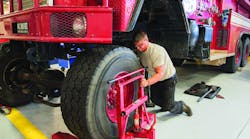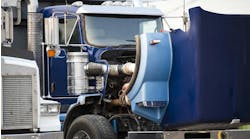Managers: Golangia Jenkins, vehicle control officer, and David Ostrander, fire truck maintenance section supervisor
Company: 96th Logistics Readiness Squadron
Operation: Providing supplies, fuels, transportation, relocation, and deployment support at Eglin Air Force Base in Florida
PROBLEM:
Eglin Air Force Base officials recently shared an interesting story regarding the efforts of the 96th Logistics Readiness Squadron (LRS) in repairing one of Eglin’s much-needed fire trucks.
The 96th LRS faces a wide range of duties at Eglin: dispensing millions of gallons of aircraft fuel, shipping military cargo all over the world, and taking care of 1,800 vehicles ranging from police patrol cars on up to heavy trucks. In fact, the unit handled 35,000 vehicle repairs in 2014 alone.
Yet when one of Eglin’s fire trucks—called Tanker 46—needed serious repairs, Tech. Sgt. Golangia Jenkins, the vehicle control officer for the 96th Civil Engineer Group within the 96th LRS, knew he couldn’t just run out and drop nearly half a million dollars to buy a new one.
But fixing the broken front axle on Tanker 46, a 1989 model 54,000-lb.-GVW fire truck equipped with a 2,000-gal. water tank, wouldn’t be easy because of the truck’s age.
“Its parts are obsolete, and there is no funding in the foreseeable future to replace that vehicle,” Jenkins says.
What to do?
SOLUTION:
Old-fashioned elbow grease and luck provided the answer for the airmen and civilian contractors within the 96th LRS Fire Truck Maintenance Section.
“These days, it’s difficult and expensive to obtain parts for a 1989 model truck,” David Ostrander explains. “We decided to try to find a cost-effective alternative first, and look for a vehicle in our area.”
After a detailed search, the group discovered the same model fire engine, one slated for the salvage yard, at nearby Tyndall Air Force Base. Fortunately, the 5,000-lb. front axle the 96th LRS crew needed to fix Tanker 46 proved serviceable.
“We were very lucky to find that fire engine,” Ostrander notes. “The fire engine is a critical vehicle [as] Eglin is required to have a certain amount of water on hand based on the number of aircraft and range size.”
First, LRS personnel made a four-hour round-trip to Tyndall to get the old fire engine to Eglin, then spent eight hours removing the axle and differential assembly from the Tyndall truck for reinstallation into the frame of Tanker 46.
“It’s what we do; it’s not that difficult of a job, but it is a heavy job,” Ostrander explains. “But it is very unusual to do a complete assembly repair like that. Those parts don’t break very often.”
Yet the job saved some $25,000, according to Jenkins.
Without that repair, Eglin would have been down one fire truck, which would have brought down readiness levels at the base, points out First Lt. Rachel Lyons, the 96th LRS vehicle management flight commander.
“A new fire truck would have been unlikely as the Air Force is trying to do more with less,” she says.



